Did you delete an Excel file and now can’t even find it in the Recycle Bin? It’s only natural to panic in a situation like this, especially if the Excel file had important data and you were working on it for hours.
The first thought that comes to mind in such situations is how to retrieve deleted Excel file not in Recycle Bin. Another question that accompanies it is why the files are not in the Recycle Bin! And where do such files go if they don’t make their way to the Recycle Bin?
So in this guide, we will explore all the reasons why a deleted Excel file is not in the Recycle Bin. Next, we will show you how to recover deleted Excel files on Windows and Android.
Reasons for Deleted Excel File Not in Recycle Bin
There can be multiple reasons why you can’t find a deleted Excel file inside the Recycle Bin. This includes large file size, incorrect settings, insufficient space, and so on.
Let’s explore each of these reasons in detail to get a better understanding of why you can’t find that Excel file in the Recycle Bin:
Files are Deleted by Shift + Delete
Windows OS offers a number of shortcuts to perform different operations. One such shortcut is Shift + Delete, which directly deletes the files.
So, if you deleted the Excel file using the Shift+Delete keys, then it will be deleted directly (skipping the Recycle Bin).
Improper Settings
Another reason why you can’t find the Excel file in the Recycle Bin is incorrect settings. Many users opt for the files to be deleted directly without moving them to the Recycle Bin.
To check this, right click on the Recycle Bin icon and select Recycle Bin Properties. If the “Don’t move files to the Recycle Bin. Remove files immediately when deleted” option is checked, then all files (including Excel files) will be deleted without going to the Recycle Bin.
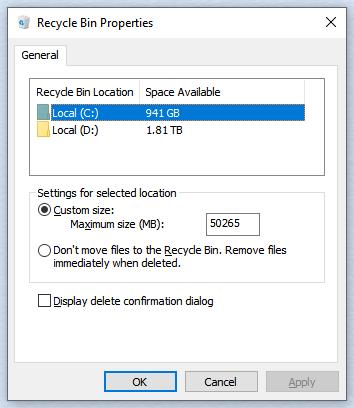
The Recycle Bin Gets Emptied
Did you empty the Recycle Bin by any chance? Then that’s yet another reason why the Excel file can’t be found in the Recycle Bin.
Also, Windows automatically deletes all the files in the Recycle Bin after 30 days by default. So, if it’s been a while since you deleted the Excel file, then it will also be removed from the Recycle Bin to conserve space.
Files are Deleted from the External Hard Drive
The files which are deleted from external storage devices don’t go to the Recycle Bin at all. So, if you deleted the Excel file from an SD card, USB drive, or an external hard drive, then it will bypass the Recycle Bin.
The Deleted Excel File is too Large
The Recycle Bin reserves a specific percentage of each drive’s capacity. Normally, this is around 5-10% but it can also be changed by the users.
So, if the deleted Excel file is larger than the allocated space, Windows will delete the file directly and bypass the Recycle Bin. The Windows OS shows a warning in cases like this and only deletes the file if the user confirms their choice.
Not Enough Space
Although rare, the Recycle Bin folder can run out of free space. When this happens, Windows starts to delete files directly without sending them to the Recycle Bin.
This usually happens if you have not allocated sufficient space for the Recycle Bin folder or the Recycle Bin is full because you deleted too many files.
The Recycle Bin is Corrupted
The Recycle Bin will not store the deleted files if it gets corrupted. Now, it can get corrupted due to malware, system errors, or sudden shutdowns.
So, when the Recycle Bin is corrupted, all the deleted files (including Excel files) will be deleted permanently. Normally, such issues can be fixed by running a disk check to repair errors or via the Command Prompt.
Learn more: How to Fix the Recycle Bin on C Is Corrupted Error
Where Does the Deleted Excel File Go Other Than Recycle Bin?
When you delete an Excel file and it is not present in the Recycle Bin, it doesn’t mean it has vanished into thin air! The Excel file is still available on the storage drive, but not visible.
When a file is deleted, it is marked as free space on the hard drive. Now, that file will remain available unless new data is overwritten on it. So until a new file takes up the free space, it is still possible to recover the deleted files.
Even if the file was deleted using Shift+Delete, from an external drive, or it didn’t move into the bin for some reason, it can still be recovered using the right tools.
In situations like this, it is important to act quickly and avoid saving new data to the same drive. If you keep saving new data to the drive, the chances of a successful recovery will go down significantly.
How to Retrieve Deleted Excel File Not in Recycle Bin Windows?
Now that you understand why the files are not in the Recycle Bin, the next big question is how to retrieve deleted Excel file not in Recycle Bin?
Well, you can do it using Windows File Recovery, file history, or Windows Backup. Let’s explore all of these 3 methods in detail so that you can recover that deleted Excel file:
1. Use Windows File Recovery
One of the most common ways to recover a deleted Excel file is by using the Windows File Recovery (command line app). It is a free tool which allows you to recover lost or deleted files from local storage or external storage devices.
So, even if the Excel file is nowhere to be found in the Recycle Bin, just follow these steps to recover it via Windows File Recovery:
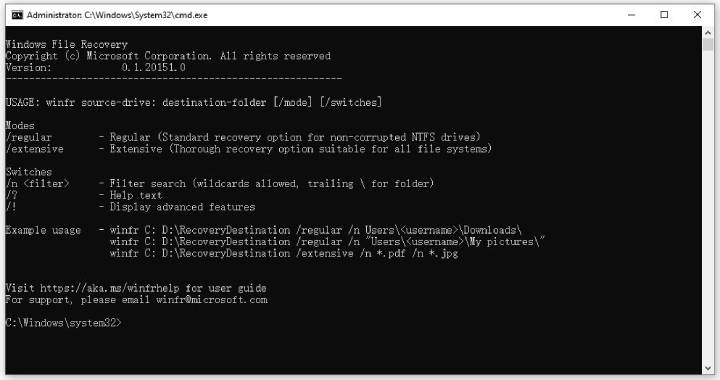
Step 1: Install the Windows File Recovery tool from the Microsoft Store. Now, press the Windows Key + S and type Windows File Recovery. From the search results, choose the Windows File Recovery and run it as an administrator.
Step 2: Now, you need to run the command to recover the files. According to Microsoft, this is the default recovery command: winfr SourceDrive: DestinationDrive: /switches
Example: To recover Excel files from C: and save them in E: using the regular mode: winfr C: E: /regular /n *.xlsx
Step 3: Now, you can view and access the recovered files in a folder named Recovery_<date> on the destination drive.
Tip:
Make sure to save the recovered files on a different drive to avoid overwriting deleted data.
2. Use File History
Many users search for how to retrieve deleted Excel file not in Recycle Bin without any tool/software. If this defines you, then you can easily use the File History feature in Windows to recover the Excel files.
File History is a useful feature in Windows which allows you to recover files from accidental deletion or loss. This feature saves a backup of your folders, which can be recovered to regain access to lost files.
Please follow these steps to recover the deleted Excel file using File History:
Step 1: Find the folder where the Excel file was present.
Step 2: Right-click on the folder and select Restore previous versions.
Step 3: You will see all the previously stored versions.
Step 4: Choose a version and then click on Restore.
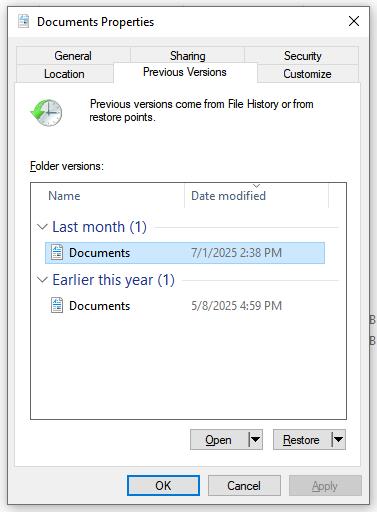
3. Use Windows Backup
Another easy and effective way to recover deleted Excel files is via the Windows Backup. However, you can only use this option if the Windows Backup feature was enabled on your computer.
Please follow these steps to recover the deleted Excel file via Windows Backup:
Step 1: Press the Windows+S to open the search feature.
Step 2: Now type Control Panel and then open it.
Step 3: Inside the Control Panel, go to System and Security > Backup and Restore (Windows 7).
Step 4: Click on the “Restore my files” option.
Step 5: Use the Browse for files option to locate the Excel file you want to recover. If you know the exact name, then use the Search option.
Step 6: Now, choose a location where you want to store the file.
Step 7: Click on Restore and wait for the process to finish.
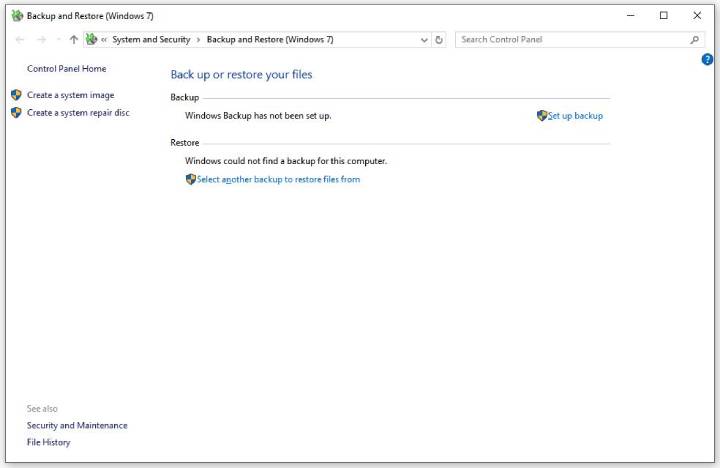
BONUS: How to Retrieve Deleted Excel File Not in Recycle Bin Android?
There are a lot of built-in options to recover a deleted Excel file on Windows. On the contrary, there are no such built-in tools for the Android OS. Thankfully, you can still easily recover deleted/lost Excel or any other file using iToolab RecoverGo Android.
Main features of RecoverGo Android:
- It can recover 12 file types, like documents, photos, videos, and more.
- Based on the advanced technology, it guarantees a high success rate of recovery.
- The tool is easy to use, no need for any technical knowledge.
- You can preview the data before you recover it.
The best part? iToolab RecoverGo Android is a highly reliable Android data recovery tool which supports 6,000+ devices (phones and tablets). This tool is also compatible with the latest Android 16 OS, making it the top Android data recovery software in the market.
Here’s a step-by-step process on how you can recover a deleted Excel file or any other file using the iToolab RecoverGo Android:
Step 1 To get started, install the iToolab RecoverGo Android on your PC. After that, connect the Android device and then launch the RecoverGo (Android). Choose the “Recover Deleted Data from Device” option.
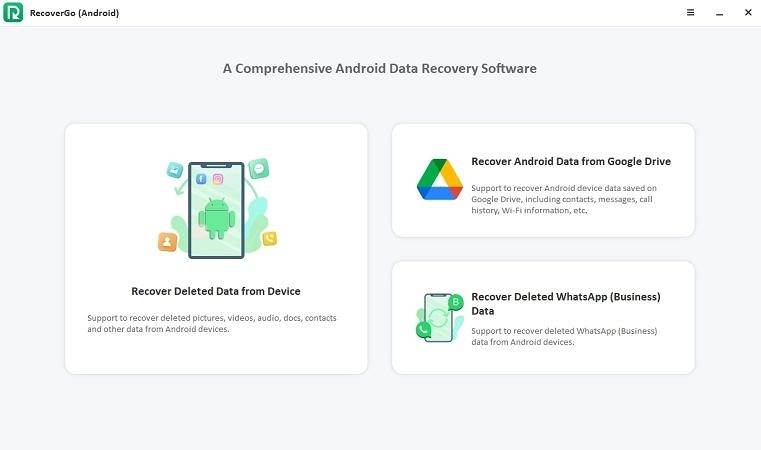
Step 2 Now, enable the USB debugging mode on your Android device by following the on-screen instructions.
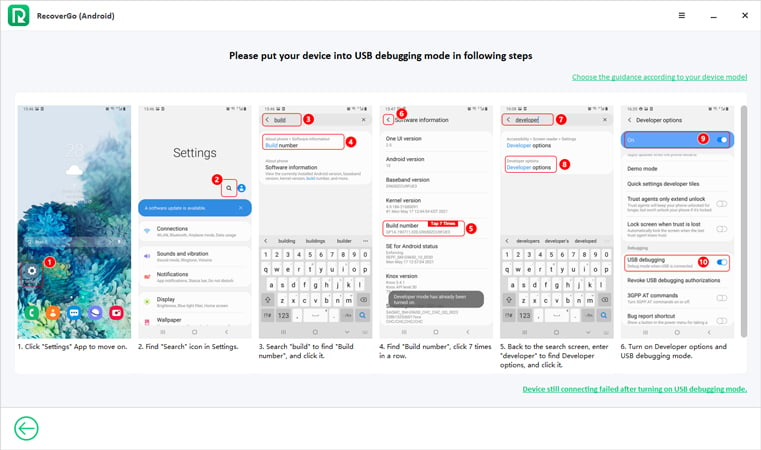
Step 3 Now, choose the file type you want to recover. To recover an Excel file, select the Documents option and click on the Scan button.
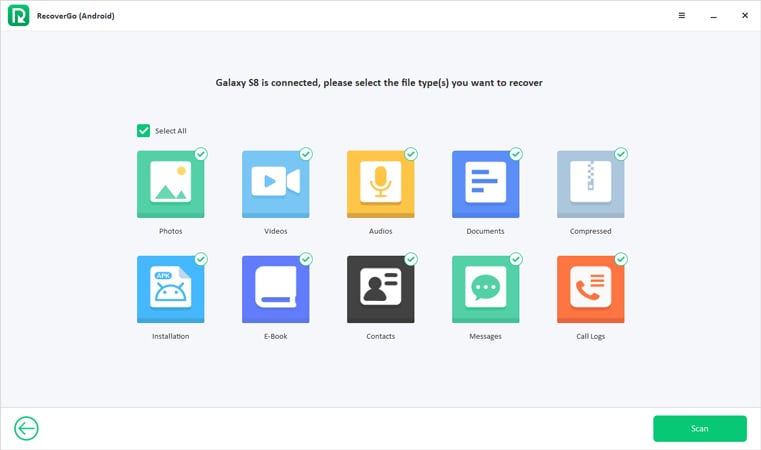
Step 4 Once the Scan is complete, you will see all the files that can be recovered. Now, all that’s left is to press the Recover button to finish the recovery process.
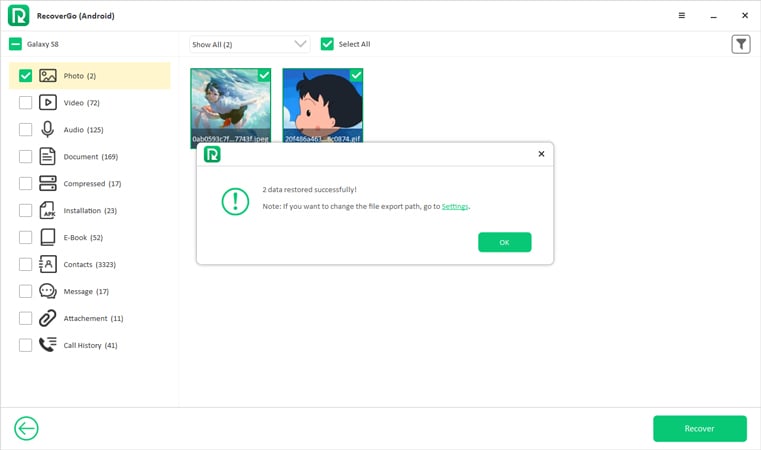
Wrap Up
If you have ever worked hours on an Excel file only to realize it’s been lost/deleted, you will know how frustrating it can be.
But, you no longer have to worry about how to retrieve deleted Excel file not in Recycle Bin! In this handy guide, we have covered 3 easy ways to recover Excel files on Windows, even if they’re not present in the Recycle Bin.
We have also covered an easy method to recover the deleted Excel files (or any other files) on Android using iToolab RecoverGo Android. With Android 16 support and compatibility with 6000+ devices, you can easily recover any files on Android within minutes.

